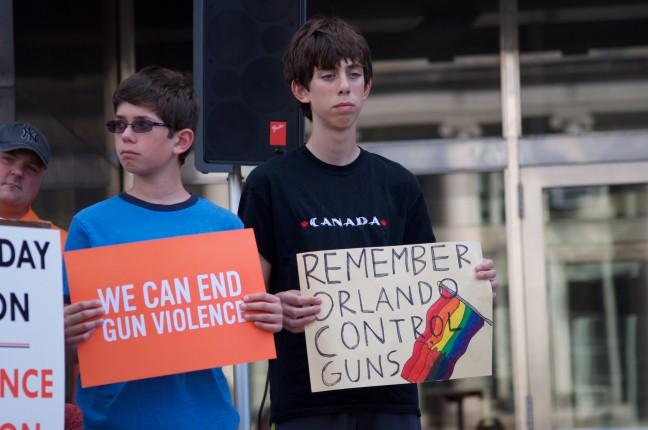Sebring, Fla. Palm Springs, Calif. Aurora, Ill. Chippewa County, Wis.
These four cities are a select subset of the 21 mass shootings that have taken place this year as of Oct. 1. Mass shootings, shooting threats and incidents with guns have all risen within the last few years and yet, little to no gun control legislation has been passed on either the Federal or state level.
Wisconsin, with a Republican majority Assembly and Senate, has been among the most extreme opponents of any gun control legislation. But in September, Democratic Gov. Tony Evers called for Extreme Risk Protection Order, aka ‘red flag’ gun laws in Wisconsin. These laws would “allow family or friends can petition a judge to temporarily revoke someone’s right to buy, own or carry weapons if they believe that person may be a threat to themselves or others.”
Essentially, ERPOs would empower families, safeguard household members and allow law enforcement to save lives by identifying a person who has either made direct threats to themselves or others and temporarily removing their weapons from their person or home.
At least 13 states across the country and the District of Columbia have implemented ERPOs — and the 115th Congress introduced S.2521 in 2018, called the Federal Extreme Risk Protection Order Act of 2018, which was referred to the Senate Committee on the Judiciary in early 2018.
Here in Wisconsin, LRB4383, introduced by State Rep. Melissa Sargent, D-Madison. and State Sen. Lena Taylor, D-Milwaukee, “creates an extreme risk protection temporary restraining order and an extreme risk protection injunction.”
While this bill has the broad support of the Democratic caucus, Evers and Attorney General Josh Kaul, the Republican majority, namely Speaker Robin Vos, R-Rochester, and Senate Majority Leader Scott Fitzgerald, R-Juneau, who released a joint statement expressing concern with the proposed legislation.
They said introducing ERPOs “poses threats to due process and the Second Amendment rights of law-abiding citizens.”
While Wisconsin continues to debate the merits of implementing ERPOs, states across the country have had substantial successes in regards to declining gun incidences. In practice, ERPOs have consistently proven to be effective in preventing potential attacks and gun related incidents. Indiana and Connecticut have had ERPOs in place for nearly two decades and the results speak for themselves.
“Thousands of guns have been confiscated from more than 1,890 people in Connecticut,” according to the Connecticut State Judicial Branch. “By the end of June [2019], 117 people had been issued risk warrants this year. Some surrendered dozens of weapons. [In 2018], a record 260 people gave up their firearms. Most of the firearms were registered, records show.”
Temporarily removing guns from persons deemed dangerous in Connecticut has likely contributed to the state suicide rate dropping by 12% since 1999 and prevented many mass shootings and killings from occurring statewide.
Moreover, Indiana — a state with a deep-rooted Second Amendment tradition and one of the more conservative states in the union — nearly unanimously passed an ERPO bill in 2009. Since the adoption of the bill, state suicide rates have dropped by 7.5% and citizens have gotten the immediate help they desperately need before committing an atrocity.
“Over three-quarters of the attackers had made threatening or concerning communications, and a similar number had elicited concern from others,” data from the U.S. Secret Service National Threat Assessment Center shows. “Further, most had histories of criminal charges, mental health symptoms and/or illicit substance use or abuse.”
It is entirely possible that more ERPO laws across the country would have prevented some of these attacks. Nearly three-quarters of attackers elicited concern from others — had ERPOs been available, lives could have been saved.
California was recently the subject of an intensive case study and analysis by the Annals of Internal Medicine, titled Extreme Risk Protection Orders Intended to Prevent Mass Shootings. This stark case study found that between 2016-2018, 414 cases were reported of citizens requesting an ERPO on someone in their lives. More shockingly, this study found “21 cases in which ERPOs were used in efforts to prevent mass shootings.” In addition to lowering state suicide rates and opening the door to more mental health treatment, ERPOs again and again have shown that they can — and do — prevent mass shootings.
ERPOs do not prevent law-abiding, able-bodied citizens from purchasing, selling or owning firearms — rather, they temporarily remove firearms from the homes of persons deemed dangerous to themselves or others. If a person is having suicidal ideations or threatening a shooting, temporarily removing access to their firearms is not unlawful or unconstitutional — it is common sense.
Across the nation, and especially in Wisconsin, ERPOs and broad gun control legislation are widely supported. A Marquette Law poll found 80% of Wisconsinites support specific gun control measures and 71% of Americans specifically support ERPOs.
ERPO legislation is currently being heard in Mich., Minn., N.C., Ohio and Pa. Our neighbor, Michigan, is in a similar boat as us. With a Republican majority in both the Assembly and the Senate and a Democratic governor, Michigan lawmakers have still come together to hear a bill related to ERPOs — regardless of the passage, Michigan has shown that divided government can agree to debate the merits of ERPOs.
Wisconsin cannot allow partisan gridlock from hearing LRB4383. This is not a partisan issue — this is an issue of saving lives. Speaker Vos, Majority Leader Fitzgerald and the Republican caucus must hear this lifesaving legislation.
States such as Calif., Ind., and Conn. have statistically shown a direct correlation between the passage of these laws and a decrease in gun incidences. Wisconsin cannot become home to another mass shooting.
William Keenan (wkeenan3@wisc.edu) is a senior studying political science.


